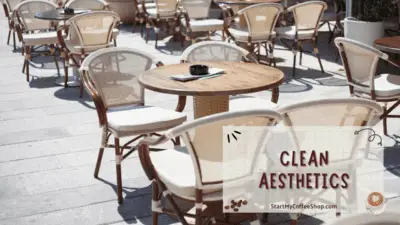A coffee shop counter is the heart and soul of any modern café, serving as a central hub where baristas create masterpieces and customers gather to savor their favorite brews. In today’s competitive coffee industry, having a well-designed coffee shop counter is essential for both aesthetics and functionality.
Some key elements of a modern coffee shop counter design include clean and minimalist aesthetics, efficient workspace layout, high-quality materials, integrated technology, and customer-friendly features like self-service options or mobile ordering integration.
This article explores the key elements and features that make up a modern coffee shop counter, focusing on clean aesthetics, efficient workspace layout, high-quality materials, integrated technology, and customer-friendly features.
Clean Aesthetics
When customers walk into a coffee shop, the first thing they notice is the counter. It’s the focal point, the center of attention. That’s why a clean and visually appealing coffee shop counter is crucial—it sets the tone for the entire café experience.
Modern coffee shop counters are known for their sleek lines, minimalist designs, and clutter-free appearance. They exude a sense of simplicity and sophistication. By embracing clean aesthetics, coffee shop owners create an inviting space that draws customers in and makes them feel at ease.
To achieve this aesthetic, coffee shop counters should blend seamlessly with the overall café theme and branding. Consistency is key. Whether it’s a rustic coffee house or a contemporary urban café, the counter design should reflect the ambiance and identity of the establishment. This harmony between the counter and the café’s overall style creates a cohesive and inviting atmosphere.
When it comes to color choices, neutral tones are often favored in modern coffee shop counter design. Whites, grays, and warm wood tones create a clean and timeless look that appeals to a wide range of customers. These colors also provide a blank canvas for showcasing the vibrant colors of coffee beverages or other items on display.

In addition to color, lighting plays a crucial role in enhancing the visual appeal of a coffee shop counter. Strategically placed lights can accentuate key areas of the counter, such as the display of pastries or the barista station. Proper lighting not only highlights the counter’s features but also adds a touch of sophistication and elegance to the overall design.
By paying attention to the cleanliness and aesthetics of the coffee shop counter, café owners demonstrate their commitment to quality and customer satisfaction. A well-designed counter not only entices customers to approach and place their orders but also sets the stage for the entire café experience. It creates an atmosphere that customers find comfortable, stylish, and welcoming.
Read more about Cost to Start Dunkin’s Coffee Shop: Analyzing the Cost Factors
Efficient Workspace Layout
A well-designed coffee shop counter goes beyond aesthetics; it is also crucial for optimizing the workflow and efficiency of baristas. The workspace layout plays a vital role in enabling baristas to move swiftly and smoothly, ensuring that they can serve customers with speed and precision.
To achieve an organized and ergonomic workspace, the placement of equipment and tools must be carefully considered. The positioning of espresso machines, grinders, and brewing equipment should be strategically arranged to minimize the time spent on each task.
For example, placing the espresso machine and grinder side by side allows baristas to seamlessly transition from grinding beans to brewing shots, minimizing any delays in the coffee-making process. By reducing unnecessary movements and streamlining the workflow, an efficient layout contributes to faster service and enhanced customer satisfaction.
In addition to equipment placement, a well-designed coffee shop counter ensures that all necessary ingredients, tools, and supplies are within easy reach of the baristas. This eliminates the need for baristas to constantly search for items, saving valuable time during peak hours.
For instance, organizing coffee beans, syrups, milk, and other essentials in proximity to the barista station allows for quick access and efficient preparation of orders. Similarly, having storage compartments or shelves for cups, lids, and other serving accessories nearby helps baristas maintain a smooth workflow without interruption.
Moreover, ergonomic considerations are essential for the comfort and well-being of baristas. The counter should be designed at a suitable height to prevent strain on the baristas’ backs and arms during prolonged periods of standing and serving. Providing anti-fatigue mats can also alleviate pressure on their feet and minimize discomfort.
By implementing an optimized workspace layout, coffee shop owners and designers empower baristas to perform at their best, improving overall operational efficiency and customer service. A well-designed coffee shop counter not only enhances the baristas’ experience but also reflects the commitment of the café to creating a seamless and enjoyable coffee-drinking experience for customers.
High-Quality Materials
The materials chosen for a modern coffee shop counter are pivotal in determining its durability, aesthetics, and overall impression. Countertops made of high-quality materials, such as quartz, granite, or stainless steel, not only provide a sleek and professional appearance but also offer practical benefits.
These materials are known for their resistance to stains, scratches, and heat, ensuring that the counter can withstand the demands of a bustling coffee shop environment while maintaining its pristine look.
Quartz countertops, for example, are engineered to be durable, non-porous, and resistant to staining. Their smooth and uniform surface is easy to clean, making them ideal for coffee shops where spills and messes are inevitable.
Granite countertops, with their natural beauty and unique patterns, create an upscale and sophisticated vibe, adding a touch of luxury to the café’s ambiance. Stainless steel countertops, often associated with professional kitchens, provide a clean and hygienic surface, while also being resistant to heat and scratches.
In addition to the choice of countertop material, incorporating wood accents into the coffee shop counter design can introduce warmth and a sense of natural elegance. Wood adds a touch of organic beauty and creates a welcoming atmosphere for customers. Whether it’s the trim, shelving, or other decorative elements, the use of wood can complement the chosen countertop material and enhance the overall aesthetic appeal of the counter.
The selection of materials should align with the café’s branding and style. For instance, a rustic-themed coffee shop might opt for a countertop with a distressed wood finish to evoke a cozy and nostalgic ambiance.
On the other hand, a modern and minimalist café may lean towards a sleek quartz or stainless steel countertop to convey a contemporary and clean look. The materials used should reflect the café’s personality and create a cohesive and memorable visual experience for customers.
The high-quality materials chosen provide a sense of professionalism and quality to customers, enhancing their perception of the café. A visually appealing and well-crafted counter, with its choice of materials, elevates the overall experience, making customers feel welcome, comfortable, and confident in the café’s commitment to excellence.
Integrated Technology

In today’s fast-paced world, technology has become an integral part of the coffee industry, transforming the way coffee shops operate and enhancing the overall customer experience. By incorporating technology into the coffee shop counter design, both efficiency and convenience can be significantly improved.
One essential technological feature is the integration of point-of-sale (POS) systems. These systems streamline transactions, automate inventory management, and provide valuable insights through customer data analysis.
By integrating the POS system into the coffee shop counter, baristas can effortlessly process orders, track inventory levels, and access vital information—all from a centralized location. This integration eliminates the need for additional devices or clutter on the counter, enhancing its overall aesthetics.
Another technological advancement that can be seamlessly integrated into the coffee shop counter is self-service kiosks or mobile ordering systems. These innovations empower customers to place their orders conveniently and efficiently. Self-service kiosks allow customers to browse the menu, customize their orders, and make payments directly at the counter.
By eliminating the need for customers to stand in line, self-service kiosks reduce wait times during busy periods, enhancing customer satisfaction. Similarly, mobile ordering integration enables customers to place orders using their smartphones, allowing them to skip the queue and have their orders ready for pickup or delivery.
Read more about Cost To Open Coffee Ice Cream Shop: From Investment to Indulgence
Customer-Friendly Features
Modern coffee shop counters go beyond functionality; they strive to create a delightful experience for customers. By incorporating customer-friendly features, café owners can elevate the overall café experience and foster a sense of engagement and convenience.
One customer-friendly feature is providing a dedicated area for customers to personalize their beverages. This can include a selection of syrups, toppings, or flavorings that customers can add to their coffee or other drinks.
By offering customization options, customers feel empowered to tailor their beverages to their unique preferences. This personalization not only enhances the taste of the drinks but also creates a sense of engagement and involvement in the coffee-making process.
Another customer-friendly feature is the inclusion of self-service stations. These stations can be set up for water, napkins, sugar, or other commonly used items. By having these self-service options readily available, customers can help themselves without having to wait for assistance from the staff.
This enhances convenience and reduces potential bottlenecks during busy periods. It also empowers customers to have control over their experience, allowing them to quickly and efficiently access the items they need without interrupting the baristas’ workflow.
Summary
Designing a modern coffee shop counter involves careful consideration of several key elements. From clean aesthetics to efficient workspace layout, high-quality materials to integrated technology, and customer-friendly features, each component contributes to the overall ambiance and functionality of the café.
By implementing these elements thoughtfully, café owners and designers can create an inviting space that enhances the coffee shop experience for both baristas and customers alike. With attention to detail and a commitment to excellence, the coffee shop counter becomes a focal point that reflects the café’s identity, passion for coffee, and dedication to providing an exceptional coffee experience.
So, whether you’re a café owner, a coffee enthusiast, or simply someone who appreciates a well-designed space, let’s raise our cups to the artistry and craftsmanship that goes into creating the perfect modern coffee shop counter. Cheers!
Frequently Asked Questions

Q: How can a modern coffee shop counter design enhance the overall customer experience?
A: A well-designed coffee shop counter creates a visually appealing and inviting atmosphere, streamlines workflow for baristas, incorporates convenient features like self-service options and integrates technology for faster transactions, ultimately improving efficiency and customer satisfaction.
Q: How can the choice of materials impact the durability and aesthetics of a coffee shop counter?
A: The choice of materials plays a vital role in the durability and aesthetics of the coffee shop counter. Materials like quartz, granite, or stainless steel offer durability, resistance to stains and scratches, and a professional look. Wood accents can add warmth and elegance while aligning the materials with the café’s branding creating a cohesive and memorable visual experience for customers.
Q: What technological features can be integrated into a modern coffee shop counter design?
A: Modern coffee shop counters can incorporate various technological features, including integrated point-of-sale (POS) systems for streamlined transactions and inventory management, self-service kiosks for convenient order placement, mobile ordering integration for reduced wait times, and even features like wireless charging stations for customers’ devices.
To learn more on how to start your own coffee shop checkout my startup documents here
Please note: This blog post is for educational purposes only and does not constitute legal advice. Please consult a legal expert to address your specific needs.

Hi! I’m Shawn Chun
My adventure in coffee began when I first launched my first coffee shop back in the early 2000s. I had to figure out so many things on my own and to make it worse within 2 years of opening two large corporate coffee chains moved in just blocks away from me!
As I saw smaller and even some larger coffee shops in the neighborhood slowly lose customers to these giant coffee chains and slowly close up shop, I knew that I had to start getting creative…or go out of business.
I (like you may be) knew the coffee industry well. I could make the best latte art around and the foam on my caps was the fluffiest you have ever seen. I even had the best state-of-the-art 2 group digital Nuova Simonelli machine money could buy. But I knew that these things alone would not be enough to lure customers away from the name brand established coffee shops.
Eventually, through lots of trial and error as well as perseverance and creativity I did find a way to not only survive but also thrive in the coffee/espresso industry even while those corporate coffee chains stayed put. During those years I learned to adapt and always faced new challenges. It was not always easy, however, in the end, I was the sole survivor independent coffee shop within a 10-mile radius of my location. Just two corporate coffee chains and I were left after that year. All told the corporate coffee chains took down over 15 small independent coffee shops and kiosks and I was the last one standing and thriving.
Along the years I meet others with the same passion for coffee and I quickly learned that it is not only “how good a barista is” that makes a coffee shop successful, but the business side of coffee as well.
Hence why I started this website you are on now. To provide the tools and resources for up and coming coffee shop owners to gain that vital insight and knowledge on how to start a coffee shop successfully.
Stick around, browse through my helpful blog and resources and enjoy your stay! With lots of LATTE LOVE!
Shawn







